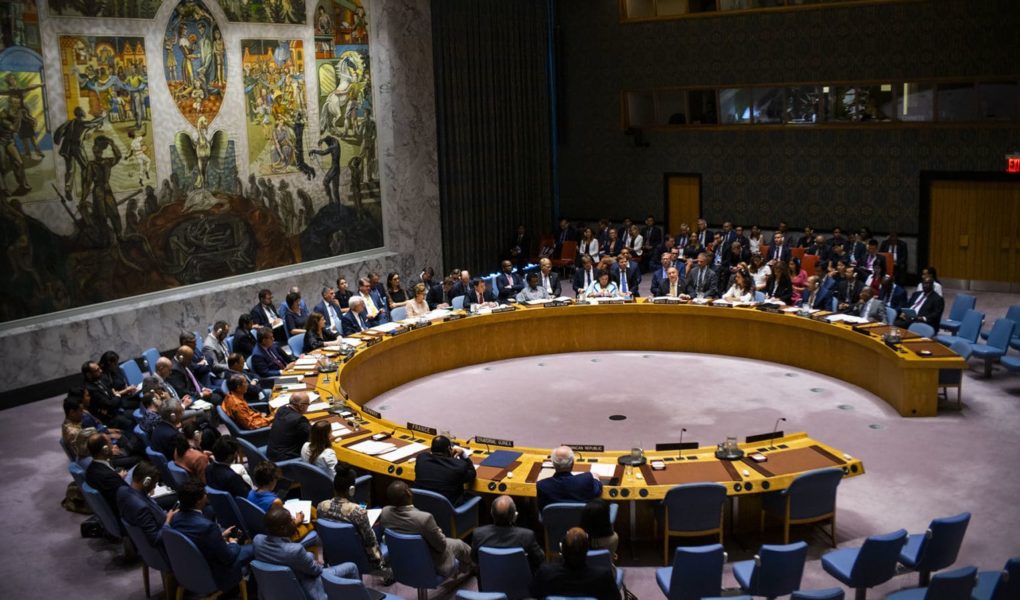The United States has put forward a United Nations Security Council resolution this week to extend the arms embargo on Iran – an effort that should be supported by all committed to stability in the Middle East. In the event this measure fails, Washington should not hesitate to pursue a snapback of sanctions on Tehran.
The UN’s arms restrictions are tied to Security Council Resolution 2231, which endorsed the nuclear deal with Iran. Like other provisions of the agreement, these restrictions have a fast-approaching expiration date – one whose arrival in October will be “a huge political success” that allows the regime to “easily buy and sell weapons,” according to Iran’s own president.
This “success” is about to unfold, even though Iran has already flagrantly flouted nuclear and arms restrictions imposed by the deal, as well as UN restrictions on arming Hezbollah in Lebanon and Houthi insurgents in Yemen.
As a bipartisan majority of US representatives have warned, the embargo’s lifting “could have disastrous consequences for US national security” and that of regional partners, including Israel and the Gulf states. After all, the Iranian regime has long demonstrated its commitment to violently expanding its influence and attacking US interests throughout the Middle East – even while subject to an embargo.
Iranian arms have been funneled to some of the greater Middle East’s most ruthless killers, including Hezbollah, Bashar al-Assad, Hamas, Palestinian Islamic Jihad, Shiite militias in Syria and Iraq, the Taliban, and the Houthis. Since last summer, Iran and its proxies have only continued pursuing their ambitions by force, killing three Americans and a British service member in Iraq, attacking tankers near the strategically important Strait of Hormuz, downing a US surveillance drone, and striking Saudi oil facilities.
For all this belligerence, Iran has been hampered by the embargo in its efforts to acquire advanced capabilities. The Defense Intelligence Agency (DIA) noted in November that “Tehran continues to face significant procurement obstacles” under the embargo, with many countries “unwilling” to sell it military equipment. It stands to reason that the embargo’s end will only intensify the threat posed by Iran, which will be allowed to “purchase new advanced weapon systems from foreign suppliers to modernize its armed forces, including equipment it has largely been unable to acquire for decades,” according to the DIA.
These may include Su-30 fighter jets, Yak-130 jet trainers, and T-90 battle tanks from Russia, among other systems. Iran will also likely seek to bolster its naval forces, which continue harassing US vessels and seizing tankers in international waters.
Such purchases could intensify the regional arms race, contributing to destabilization and heightened tensions. Concerns have additionally been raised that Iran could reverse-engineer the technologies it procures in order to facilitate domestic manufacturing. Moreover, without an international embargo, governments may be deterred from disrupting Iranian transfers to clients and proxies.
The international community should not reward Iran’s misbehavior and repeated violations of UN resolutions by lifting the arms embargo. The Security Council should pass the US resolution to extend arms restrictions on Iran. If the measure is vetoed by Russia or China, which stand to profit from lucrative arms sales to Iran, Washington should pursue a snapback of UN sanctions. This might be done with the help of European partners, which, despite their commitment to the nuclear deal, have acknowledged both its violation by Iran, and that the embargo’s lifting would have “major implications for regional security and stability.” Alternatively, the US could trigger the snapback mechanism unilaterally, based on the State Department’s given rationale.
Washington should likewise pursue measures outside of Turtle Bay, including by preparing to aggressively impose unilateral economic penalties in response to arms sales to Iran, and firmly broadcasting this intent to both friends and competitors like Russia and China. This could complement a broader push to counter Iranian belligerence by extending and intensifying sanctions against Tehran, heightening the regime’s internal tensions in order to encourage its collapse.
The US should concomitantly work with its allies and partners to ramp up maritime interdiction efforts targeting Iranian arms, and threaten the use of force against ground arms shipments in the Middle East. It could also extend greater support to allies on the frontlines of beating back Iran. For instance, Washington could upgrade bilateral intelligence sharing with Israel, and facilitate Israeli cooperation with Gulf partners against Iranian arms transfers to Yemen, as laid out in 2018 by a JINSA task force led by Adm. James Stavridis.
The world’s top state sponsor of terrorism, whose victims extend across and beyond the Middle East, does not need more, and more lethal, arms. America must act decisively to confront this threat, for its own security and that of the entire region.
Admiral Kirkland H. Donald, USN (ret.) is former Director, Naval Nuclear Propulsion Program and a member of the Jewish Institute for National Security of America’s (JINSA) Gemunder Center Eastern Mediterranean Policy Project. Vice Admiral John Bird, USN (ret.) is former Commander of U.S. 7th Fleet and a member of JINSA’s Gemunder Center Iran Policy Project. They are both members of JINSA’s Board of Advisors.
Originally published in Jewish Journal

